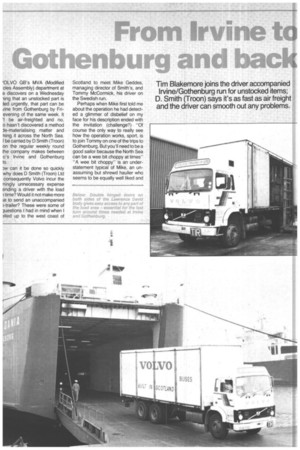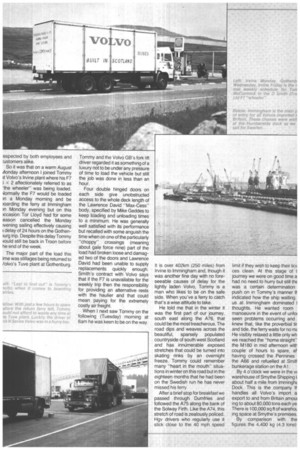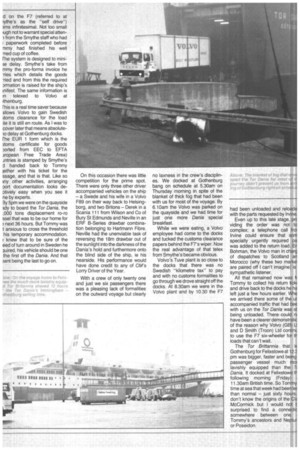From Irvine
Page 48

Page 49

Page 50

If you've noticed an error in this article please click here to report it so we can fix it.
nntlig7enburg and bac
Tim Blakemore joins the driver accompanied Irvine/Gothenburg run for unstocked items; D. Smith (Troon) says it's as fast as air freight and the driver can smooth out any problems.
'OLVO GB's MVA (Modified cles Assembly) department at e discovers an a Wednesday ling that an unstocked part is Jed urgently, that part can be dine from Gothenburg by Fnevening of the same week. It 't be air-freighted and no, o hasn't discovered a method Je-materialising matter and ning it across the North Sea. I be carried by D Smith (Troon) on the regular weekly round the company makes between o's Irvine and Gothenburg ts.
Dw can it be done so quickly why does 0 Smith (Troon) Ltd consequently Volvo incur the ningly unnecessary expense ending a driver with the load I time? Would it not make more to send an unaccompanied i-trailer? These were some of questions had in mind when I ?Med up to the west coast of Scotland to meet Mike Geddes, managing director of Smith's, and Tommy McCormick, his driver an the Swedish run.
Perhaps when Mike first told me about the operation he had detected a glimmer of disbelief on my face for his description ended with the invitation (challenge?) "Of course the only way to really see how the operation works, sport, is to join Tommy on one of the trips to Gothenburg. But you'll need to be a good sailor because the North Sea can be a wee bit choppy at times" "A wee bit choppy" is an understatement typical of Mike, an unassuming but shrewd haulier who seems to be equally well liked and espected by both employees and ;ustomers alike.
So it was that on a warm August Monday afternoon I joined Tommy tt Volvo's Irvine plant where his F7 3 x 2 affectionately referred to as the wheeler" was being loaded. +lormally the F7 would be loaded )n a Monday morning and be ioarding the ferry at Immingham )ri Monday evening but on this iccasion Tor Lloyd had for some eason cancelled the Monday ivening sailing effectively causing t delay of 24 hours on the Gothen)urg trip. Despite this delay Tommy vould still be back in Troon before he end of the week.
The major part of the load this ime was stillages being returned to folvo's Tuve plant at Gothenburg. Tommy and the Volvo GB's fork lift driver regarded it as something of a luxury not to be under any pressure of time to load the vehicle but still the job was done in less than an hour.
Four double hinged doors on each side give unobstructed access to the whole deck length of the Lawrence David -Max-Cess" body, specified by Mike Geddes to keep loading and unloading times to a minimum. He was generally well satisfied with its performance but recalled with some anguish the time when on one of the particularly "choppy" crossings (meaning about gale force nine) part of the load had broken loose and damaged two of the doors and Lawrence David had been unable to supply replacements quickly enough. Smith's contract with Volvo says that if the F7 is unavailable for the weekly trip then the responsibility for providing an alternative rests with the haulier and that could mean paying for the extremely costly air freight.
When I next saw Tommy on the following (Tuesday) morning at 8am he was keen to be on the way. It is over 402km (250 miles) from Irvine to Immingham and, though it was another fine day with no foreseeable causes of delay for the lightly laden Volvo, Tommy is a man who likes to be on the safe side. When you've a ferry to catch that's a wise attitude to take.
He told me that in the winter it was the first part of our journey, south east along the A76, that could be the most treacherous. The road dips and weaves across the beautiful, sparsely populated countryside of south west Scotland and has innumerable exposed stretches that could be turned into skating rinks by an overnight freeze. Tommy could remember many "heart in the mouth" situations in winter on this road but in the eighteen months that he had been on the Swedish run he has never missed his ferry After a brief stop for breakfast we passed through Dumfries and followed the A75 along the bank of the Solway Firth. Like the A74, this stretch of road is zealously policed. Hgv drivers who regularly use it stick close to the 40 mph speed limit if they wish to keep their lice ces clean. At this stage of t journey we were on good time a had no need to hurry but still the was a certain determination push on in Tommy's manner th indicated how the ship waiting • us at Immingham dominated thoughts. He wanted room • manoeuvre in the event of unfoi seen problems occurring and knew that, like the proverbial tir and tide. the ferry waits for no He visibly relaxed a little only wh we reached the "home straight" the M180 in mid afternoon wit' couple of hours to spare, at having crossed the Pennines the A66 and refuelled at Smitt bunkerage station on the Al.
By 4 o'clock we were in the vt warehouse of Smythe Shipping L about half a mile from ImminghE Dock. This is the company th handles all Volvo's import a export to and from Britain amoui ing to about 80,000 tons each ye. There is 100,000 sq ft of warehoL. ing space at Smythe's premises.
By comparison with the figures the 4.400 kg (4.3 tons) d on the F7 (referred to at iythe's as the "self drive") ams infinitesimal. Not too small ■ ugh not to warrant special attenfrom the Smythe staff who had ! paperwork completed before
Timy had finished his well -ned cup of coffee.
The system is designed to mini;e delay. Smythe's take from mmy the pro-forma invoice he Ties which details the goods Tied and from this the required prmation is raised for the ship's inifest. The same information is in telexed to Volvo at ithenburg.
rhis is a real time saver because allows Volvo to gain Swedish ;toms clearance for the load ile it is still en route. As I was to cover later that means absoluteto delay at Gothenburg docks.
rhe EUR 1 form which is the ;toms certificate for goods Jorted from EEC to EFTA iropean Free Trade Area) ..intries is stamped by Smythe's d handed back to Tommy jether with his ticket for the ssage, and that is that. Like so my other activities, arranging Dort documentation looks deotively easy when you see it ne by experts.
3y 5pm we were on the quayside ady to board the Tor Dania, the ,000 tons displacement ro-ro ssel that was to be our home for ? next 36 hours. But Tommy was t anxious to cross the threshold his temporary accommodation. knew that to be sure of the eed of turn around in Sweden he luired, his vehicle should be one the first off the Dania. And that )ant being the last to go on. On this occasion there was little competition for the prime spot. There were only three other driver accompanied vehicles on the ship — a Swede and his wife in a Volvo F89 on their way back to Helsingborg, and two Britons — Derek in a Scania 111 from Wilson and Co of Bury St Edmunds and Neville in an ERF B-Series drawbar combination belonging to Hartmann Fibre. Neville had the unenviable task of reversing the 18m drawbar out of the sunlight into the darkness of the Dania's hold and furthermore onto the blind side of the ship, ie his nearside. His performance would have done credit to any of CM's Lorry Driver of the Year.
With a crew of only twenty one and just we six passengers there was a pleasing lack of formalities on the outward voyage but clearly no laxness in the crew's disciplines. We docked at Gothenburg bang on schedule at 5.30am on Thursday morning in spite of the blanket of thick fog that had been with us for most of the voyage. By 6.10am the Volvo was parked on the quayside and we had time for just one more Dania special breakfast.
While we were eating, a Volvo employee had come to the docks and tucked the customs clearance papers behind the F7's wiper. Now the real advantage of that telex from Smythe's became obvious.
Volvo's Tuve plant is so close to the docks that there was no Swedish "kilometre tax" to pay and with no customs formalities to go through we drove straight off the docks. At 8.30am we were in the Volvo plant and by 10.30 the F7 had been unloaded, and reloade with the parts requested by Irvine.
Even up to this late stage, prc viding the order was not to complex; a telephone call fror Irvine could ensure that som specially urgently required pa was added to the return load. Er Bohman, the Volvo man in charg of dispatches to Scotland ar Morocco (why these two market are paired off I can't imagine) is sympathetic listener.
All that remained now was 1( Tommy to collect his return ticki and drive back to the docks he ha left jOst a few hours earlier. Whe we arrived there some of the ur accompanied traffic that had bee with us on the Tor Dania was st being unloaded. There could ni have been a clearer demonstratic of the reason why Volvo (GB) Li and D Smith (Troon) Ltd continL to use the F7 six-wheeler for tr loads that can't wait,
The Tor Brittannia that le Gothenburg for Felixstowe at 12.',] pm was bigger, faster and being passenger vessel much moi lavishly equipped than the n Dania. It docked at Felixstowe if following morning (Friday) 11.30am British time. So Tommy time at sea that week had been le: than normal — just sixty hours. don't know the origins of the CIE McCormick but I would not t surprised to find a connectic somewhere between one Tommy's ancestors and Neptur or Poseidon.






















































































